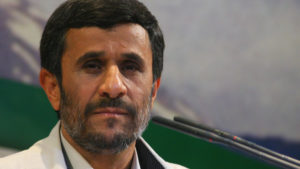by WorldTribune Staff, August 26, 2016
The rising unpopularity in Iran of the nuclear deal with world powers has helped spur the re-emergence of Mahmoud Ahmadinejad in the Islamic Republic.
When his tenure ended in 2013, the former Iranian president was “deeply unpopular at home, roundly blamed for a major decline in both domestic prosperity and global standing,” analyst Ilan Berman wrote on Aug. 25.

“He had also fallen out with his one-time protector, supreme leader Ali Khamenei, leaving him all but politically neutered.”
Now, however, as public support wanes for the nuclear accord, which was current President Hassan Rouhani’s “signature initiative”, Ahmadinejad is making a comeback.
He is “touring the Iranian countryside and giving public lectures criticizing the administration of his successor,” wrote Berman, Vice President of the American Foreign Policy Council in Washington, D.C. “He even briefly captured the international spotlight in recent days by penning an open letter to President Obama, calling on him to release some $2 billion in seized assets as a gesture of goodwill.”
A poll last month by the Center for International and Security Studies at the University of Maryland found that “Ahmadinejad now represents the single largest threat to Rouhani’s re-election, and trails the once-popular incumbent by only eight points. Suddenly, the ex-president seems once again to be a real political contender.”
The study also found “declining enthusiasm” for the nuclear deal “because most ordinary Iranians have yet to see any tangible economic dividends (even if the country’s powerful clerical army, the Revolutionary Guard, has).”
Khamenei in an Aug. 1 speech in Teheran noted the failure of last summer’s nuclear deal: “Weren’t the oppressive sanctions lifted so that the people would feel a change in their lives?”
For Ahmadinejad the anger and uncertainty provided an opening.
“In crafting his comeback, Ahmadinejad is clearly betting on the fact that a significant part of the Iranian electorate believes that, nuclear deal or no, Teheran and Washington remain fundamentally at odds. The outcome of next year’s presidential election in Iran will determine whether or not he has wagered correctly,” Berman wrote.
